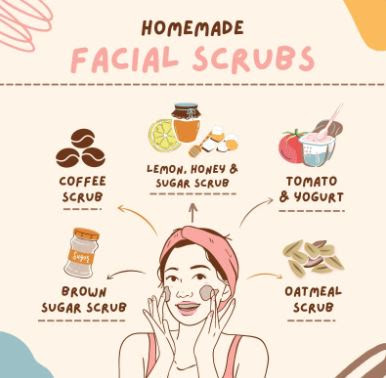Exfoliation is a skincare practice that involves the removal of dead skin cells from the surface of the skin. There are various types of exfoliants, and they can be categorized into physical (mechanical), chemical, and enzymatic exfoliants.
Physical (Mechanical) Exfoliants:
Scrubs: These contain abrasive particles that physically scrub away dead skin cells when massaged onto the skin. Examples include sugar scrubs, salt scrubs, or products with particles like apricot kernel powder.
Brushes and Sponges: Tools like facial brushes and sponges can physically buff away dead skin cells. They are often used in combination with a cleanser.
Microdermabrasion: This is a more intensive physical exfoliation method that uses a machine to spray tiny crystals on the skin to remove the outer layer.
Chemical Exfoliants:
Alpha Hydroxy Acids (AHAs): Examples include glycolic acid (from sugar cane), lactic acid (from milk), and citric acid (from citrus fruits).
Beta Hydroxy Acids (BHAs): Salicylic acid is a common BHA.
Polyhydroxy Acids (PHAs): These are milder than AHAs and include gluconolactone and lactobionic acid.
Enzymatic Exfoliants:
Papain (from papaya) and Bromelain (from pineapple): These enzymes break down and dissolve dead skin cells.
Hyaluronidase: This enzyme helps to remove dead skin cells and promote cell turnover.
Homemade Scrub:
A homemade scrub typically consists of natural ingredients that you can find in your kitchen. Common ingredients include sugar, salt, oatmeal, honey, yogurt, and oils. These ingredients are often mixed to form a paste or scrub that can be gently massaged onto the skin.+Also check; Fun facts about scrubbing!
Benefits of Homemade Scrubs in Winter:
Gentle Exfoliation: Homemade scrubs can provide a gentle exfoliation, helping to remove dry and flaky skin without causing irritation.
Moisturizing Properties: Ingredients like honey and oils in homemade scrubs can have moisturizing properties, which are especially beneficial in winter when the skin tends to be drier.
Cost-Effective: Making a scrub at home can be cost-effective compared to purchasing commercial products. It allows you to control the ingredients and avoid harsh chemicals.
Customization: You can customize homemade scrubs based on your skin type and specific needs, ensuring that you use ingredients that work best for you.
However, it's essential to use homemade scrubs with caution, ensuring that the particles are not too abrasive, and the ingredients are suitable for your skin type. Over-exfoliation can lead to irritation, especially in winter when the skin may already be more sensitive due to the cold weather.

Comments
Post a Comment